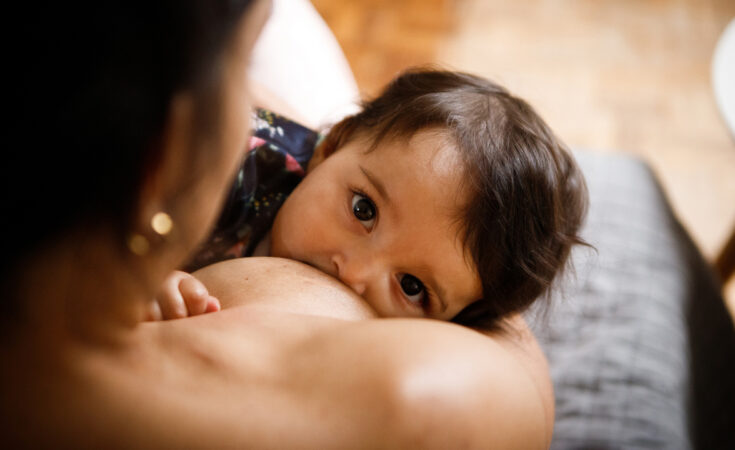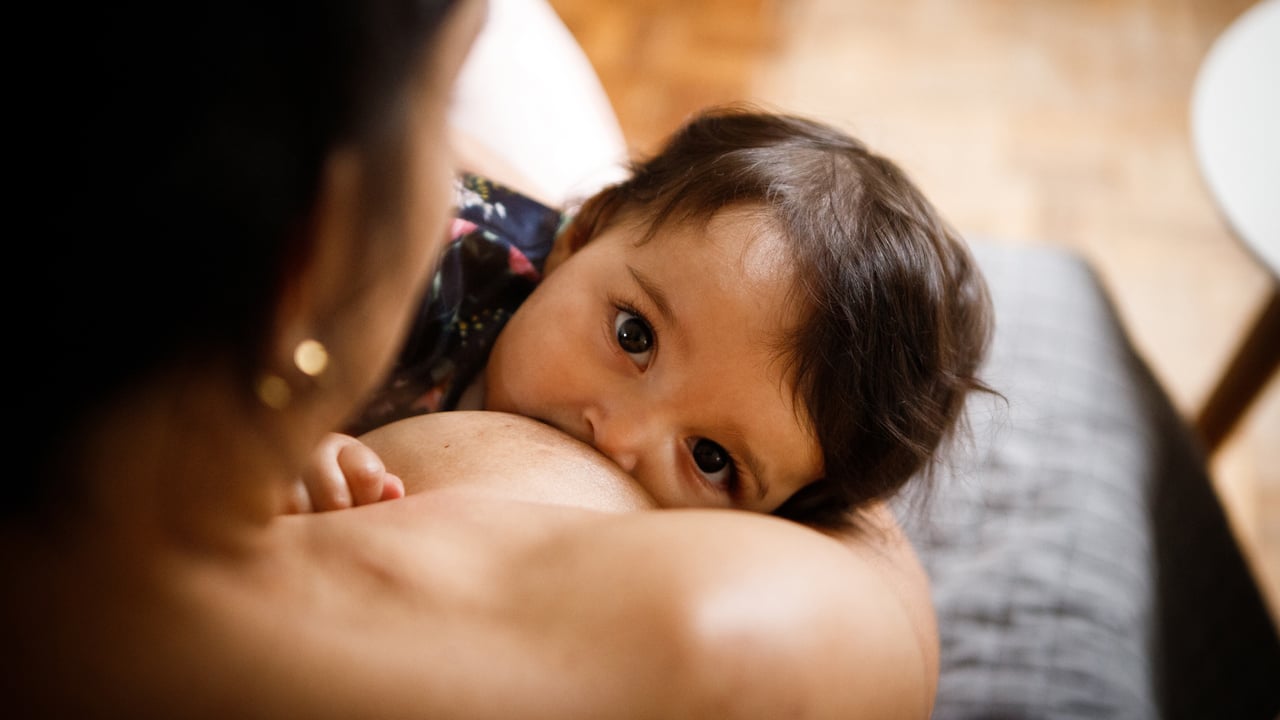By the time my daughter was a few weeks old, anyone who picked her up knew to first grab a blanket and take cover. She spit up constantly, which I hadn’t experienced with my two older kids. I worried that she was taking in too much when she fed, and then I worried that she was tossing most of it back up. Her paediatrician reassured me that her healthy weight gain and happy demeanour were signs she was getting enough to eat and she’d likely outgrow it. Luckily, she did by the time she started solids.
Feeding a newborn, whether by body or bottle, can bring up a lot of questions about timing and quantity, especially when you factor in issues like fussiness or spit up. New parents worry about everything from overfeeding their babies to their little ones going hungry. Here are some common questions about feeding and how to know your baby is getting what they need.
How often should my newborn be fed?
On average, a full-term, healthy newborn baby needs to follow a cue-based chest- or breastfeeding schedule of a minimum of 8 to 12 times in a 24-hour period, or take 2 to 3 ounces of pumped milk or formula every 3 to 4 hours. As your baby gets older, the number of times you nurse in a day will decrease because they’re getting more milk at each feed, while the amount of milk per bottle will increase. It’s important to remember that this can vary depending on each baby’s individual needs. And don’t force them to finish every feed—sometimes your baby won’t, which is fine, as long as they are hydrated and otherwise feeding well.
First-time mom, Trisha Muldoon, from Hamilton, Ont., says she benefited from her son Bertie’s* short stay in the NICU, because she learned how to decipher his hunger and fullness cues. While staying in one of the parent care rooms, she juggled breastfeeding, pumping and bottle-feeding, and received good guidance from the staff when it came to knowing how much to feed.
“The nurses showed me how to slow down his guzzling at the bottle to make sure he wasn’t getting too much [and to learn how to recognize signs that he’d had enough],” says Muldoon. While she initially needed some extra reassurance when breastfeeding, because she couldn’t see the volume he was getting (a common worry for nursing parents), she quickly learned that it was more important to recognize the signs that he was full.
So how do you know when your baby is full? What are the signs?
Quite simply, your baby will tell you. “Watch your baby’s responses before, during and after being fed,” advises Andrea Firmani, an infant feeding coordinator at St. Paul’s Hospital in Vancouver. A baby can push the bottle away or turn their head away from the chest or breast. They may fuss, begin to squirm, arch their back or decrease the frequency of sucking and swallowing with longer pauses between each. A satisfied baby will show signs of relaxation in their hands (opening from a closed fist), closed eyes, lengthening of their arms and legs and an overall calmness.
Muldoon knows it is time to end a feed if Bertie starts to push his arms into her chest or squirm. But she also knows he’s full and content when his eyes roll back and his tongue begins to flutter at her breast, which is a sign that the baby has fallen asleep.
Can you overfeed a baby?
Babies are actually very good at self-regulating their intake, meaning they eat when they’re hungry and stop when they are full. But there are some differences between nursing and bottle-fed babies, explains Firmani. A baby who is fed at the chest/breast knows when to pull away or stop sucking, whereas a bottle makes it more difficult for your baby to control the rate of flow and amount of milk they consume. There might also be a tendency for parents or caregivers to coax a baby into finishing the bottle, rather than following the baby’s fullness cues.
What are signs that a baby is overfed?
Gassiness, burping, gagging or choking, fussiness, irritability or vomiting (a forceful flow that shoots out inches rather than dribbling out of the mouth like spit up) right after finishing a bottle could be indications that your baby is being overfed. “We don’t worry about chest- or breastfed babies,” says Firmani, since they’re better than bottle-fed babies at regulating their own feeds.
It’s quite common for both bottle-fed and nursing babies to spit up in the first few months, which is generally not a cause for concern. Oftentimes, spit up or reflux happens because of a still-developing digestive system that causes the baby’s stomach contents to come back up into their esophagus. Typically, once the muscles mature, it remedies itself. If you are worried about your baby’s weight gain or diaper output, or if they seem uncomfortable after their feeds, it’s a good idea to check in with your baby’s care provider.
If baby spits up, should I feed again?
When your baby spits up it can seem like they’ve lost the whole feed, and parents often wonder whether it needs to be replaced right away. But if your baby appears content and settled, Firmani says there’s no need to worry. “Take some time to clean up and take a break from the feed. Your baby may show signs of hunger and want some extra milk or be happy to wait until their next feed” she explains. No matter how you feed them, it’s best to follow your baby’s cues regarding hunger (stirring, rooting, hands in mouth). And remember, spit up always leaves a wet spot much bigger than the actual amount that came up.
What is paced bottle feeding?
Paced bottle feeding is a method of feeding that mimics chest- or breastfeeding. As the name suggests, it involves regulating the flow from the bottle to pace the feed and give your baby better control. This helps them learn to recognize feelings of fullness. “If parents are bottle-feeding either formula or breastmilk, it’s important to use this approach,” says Firmani. By moving away from the traditional cradle hold previously associated with bottle-feeding to a more upright position, your baby has a better ability to regulate how much and how quickly they’re drinking.
“Sitting up in a chair with the baby up against your body allows them to control their sucking and gives parents a good vantage point for noticing when the sucking and swallowing is beginning to slow,” explains Firmani. Muldoon watched the nurses in the NICU using the technique. “I learned to take breaks by pulling the nipple out of Bertie’s mouth or burping him throughout his bottle feeds.”
Signs baby isn’t getting enough
The good news is you’ll be taking your baby to the doctor often in the first few weeks and months, and they’ll be following them closely to make sure their growth is on track. In the meantime, keep an eye on whether there is an adequate number of wet and poopy diapers. For the first four days of their lives, babies that are fed breast milk typically have one poo diaper for each day of life (one on the first day, two on the second day and so on). After day four, you can expect approximately 3 to 4 stools daily (formula-fed babies can have less). When it comes to wet diapers, babies typically have one wet diaper for each day of life for the first four days and then 5 to 6 (or more) wet diapers every 24 hours.
It is normal for newborns to wake up frequently to feed and connect with parents in those early weeks, so again being mindful of those hunger cues is important. If your baby isn’t getting at least eight active feeds with lots of sucks and swallows in a 24-hour period or doesn’t have an adequate number of wet or poopy diapers, get in touch with your care provider. Dehydration is rare, but can occur. If your baby hasn’t had a wet diaper in more than 6 hours or seems excessively sleepy (more than usual) or irritable, or has a dry mouth or eyes, get in touch with your healthcare provider. Remember, disposable diapers are really effective, so parents can use a couple of tablespoons of water to help determine what a sufficiently wet diaper should weigh.
* Names have been changed



































